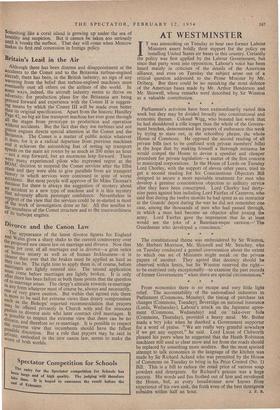AT WESTMINSTER
IT was astonishing on Tuesday to hear two former Labour Ministers assert boldly their support for the policy on installing United States air bases in this country. Certainly the policy was first applied by the Labour Government, but since that party went into opposition, Labour's voice has been heard mainly in criticism of the details of the American alliance, and even on Tuesday the subject arose out of a critical question addressed to the Prime Minister by Mr. Driberg. But there could be no mistaking the stout defence of the American bases made by Mr. Arthur Henderson and Mr. Shinwell, whose remarks were described by Sir Winston as a valuable contribution.
Parliament's activities have been extraordinarily varied this week but they may be divided broadly into constitutional and economic themes. Colonel Wigg, who boasted last week that he had shouldered a rifle longer than the whole of the Govern- ment benches, demonstrated his powers of endurance this week by trying to stare out, in the schoolboy phrase, the whole House of Commons. He opposed the second reading of all private bills (not to be confused with private members' bills) in the hope that by making himself a thorough nuisance he would compel the House to devise a speedier and cheaper procedure for private legislation—a matter of the first concern to municipal corporations. In the House of Lords on Tuesday Lord Chorley, with the support of eleven other peers, tried to get a second reading for his Conscientious Objectors Bill designed to secure a more equitable treatment for men who develop a genuine conscientious objection to military service after they have been conscripted. Lord Chorley had thirty- nine peers against him including Lord Fairfax of Cameron, who said that during the twelve months he had spent as an instructor at the Guards' depot during the-war he did not remember one case, among the thousands of men who had passed through, in which a man had become an objector after joining the army Lord Fairfax gave the impression that he at least would see the joke of a Bateman-esque cartoon= The Guardsman who developed a conscience.'
* * *.
The constitutional theme was embroidered by Sir Winston, Mr. Herbert Morrison, Mr. Shinwell and Mr. Strachey, who on Tuesday conducted a genteel conversation about the extent to which one set of Ministers might sneak on the private papers of another. They agreed that decency should be observed within limits, but Sir Winston reserved the right— to be exercised only exceptionally—to examine the past records of former Governments" when there are special circumstances."
* * * From economics there is no escape and very little light relief. The accountability of the nationalised industries to Parliament (Commons, Monday), the timing of purchase tax changes (Commons, Tuesday), Beveridge on national insurance (Lords, Wednesday), Labour's attack on the Japanese agree- ment (Commons, Wednesday) and on take-over bids (Commons, Thursday), provided a heavy meal. Mr. Butler made a Wry joke when he thanked a Government supporter for a word of praise. "We are really very grateful nowadays if we get any support," he said. Lord Lucas of Chilworth pleased his peers when he suggested that the Heath Robinson machines still used to clear snow and ice from the roads should be replaced by something more modern. But the most spirited attempt to talk economics in the language of the kitchen was made by Sir Richard Acland who was permitted by the House of Commons on Tuesday to bring in his Price Control (No. 1) Bill. This is a bill to reduce the retail price of various soap powders and detergents. Sir Richard's gesture was a huge success. His words and fun frothed out of him and enveloped the House, but as every breadwinner now knows from experience of his own sink, the froth even of the best detergents


































 Previous page
Previous page